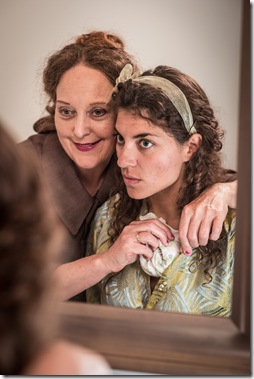The Glass Menagerie: A beautiful performance by Tim Oberholzer as son Tom, the narrator of this memory play.
Rachel Eugster and Sarah W aisvisz. Photo:
This production of The Glass Menagerie , one of Tennessee Williams most important works for the stage, is not a “striking revival” , nor is it “stunning”, “elusive” or even “heart-breaking” but it is certainly surprising. Tim Oberholzer’s performance as Tom the brother/ narrator, and figure closest to Williams own character, was so powerful and so charged with authentic feeling that it shifted the focus away from the women who are at the very heart of this memory play and set it squarely on the near tragic struggle raging within the young narrator. I have never seen such a thing happen with this play and yet it is true. Oberholzer gives Tom a depth that is very unusual.
The production generally had moments that were quite good especially in the second part when the gentleman caller ( Cory Thibert) comes to visit the timid and terrified Laura (Sarah Waisvisz) but there are also many details that kept interfering with the smooth-running of the show. Why was the little table with all the glass figures hidden off to one side where we could barely see the glass figures or that little unicorn that becomes a powerful symbol in the play? Laura is supposed to have hurt her foot so that she normally limps. Here the director has chosen to show us Laura the way her mother sees her, with no limp. That removes a certain degree of pathos that is necessary to make us feel that Laura is someone special. Strange choices by the director.
Sarah Waisvizs as Laura was much more relaxed in the second act as she confronted the young Jim and she became sincerely terrified that he would remember how she had a crush on him in high school. However, the staging of the dialogue between the young couple worked mainly because the text is so strong. In spite of David Magladry’s lighting and the candles with their quiet glow, there was no magic between the young couple. The focus on the tiny glass creature didn’t seem to matter and the magic died quickly.
One could make the same remark about Amanda (Rachel Eugster) as a woman living in her charming southern past, who browbeats her son, criticizes her daughter, and keeps drawing us back to her youth at a time when she was surrounded by the attention of her gentlemen callers. Her relapse into her old flirtatious ways as she tries to make a good impression on this his nice young man who is supposed to meet Laura but whom the mother smothers with her own ambivalent attention-getting flirtation devices that were so successful in the past, becomes a pitiful performance from the past as Amanda does not realize how she is upstaging her terrified daughter. The character of Amanda is one of the most difficult in the American repertoire because she appears to be a rather tough minded bully but if one digs a lot deeper, we see immediately that she is a most fragile and pitiful creature, teetering on the edge of mental imbalance, a sort of Blanche Dubois 20 years later. Eugster performed the hyper theatrical outer shell of Amanda but did not get near her vulnerability, her fragility, her real terror at seeing her daughter end up a lonely old maid. It was a performance that barely went skin deep. Sometimes she seemed to rush over the lines without giving thought to the rhythm of the text, while Oberholzer got all that so well. Laura also gave in to grimaces and strange facial expressions during the first part, as though she were trying too hard to perform timidity, shyness and discomfort but it left no impression at all.
It was only when Oberholzer made his appearances that the play took on real life. He captured the poetry that defines the memory play by subtly speaking out those distant images like a real artist, the painful images that had taken over his own memory and imprisoned his whole being. He then folded himself back into that unbearable world dominated by his mother. He captured the intense suffering that the mother’s self-centeredness inflicted on the others and on himself. . His facial contortions, the pain in his eyes, the free flow of his body that reflected his anger and frustration each time he threatens to “go to the movies” . The actor merged beautifully with his character as he spoke, as he moved and this fine, sensitive performance was the greatest pleasure on could derive from the evening, apart from the beauty of Tennessee Williams’s writing. David Magladry’s set worked rather well except that one wonders why the case of glass figures was hidden in a corner downstage right. It is of course, the central image of the work. The collection of absent father’s music fades in and out to indicate the changes in mood. Sometimes the musical choices were fine. Sometimes the music was almost too intrusive and should be mixed even more carefully. The music is a delicate entry into this memory world and at times it breaks the spell. However, go see this great play, go see Tim Oberholzer! It’s all on at the Gladstone.
The Glass Menagerie by Tennessee Williams, is directed by Eleanor Crowder.
A Bear & Co. production`
Set and lighting design: David Magladry
Sound design: Robert Krukowski
Costumes provided: HepKat Vintage
Cast:
Amanda Rachel Eugster
Tom Tim Oberholzer
Jim Cory Thibert
Laura Sarah Waisvisz
The play runs at The Gladstone theatre until December 6, 2014. Call 613-233-4523 for tickets.
.
